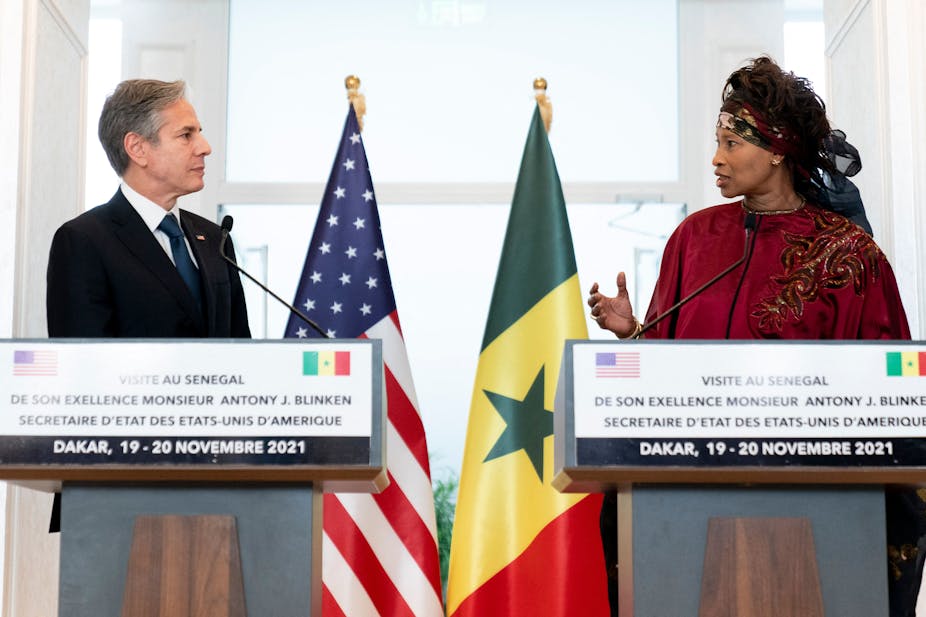In the last 20 years or so Africa has been an intermittent strategic interest for the US. Successive US presidents have attached contrasting levels of importance to the continent. This has been clear from their policies and strategic engagement.
But with the rise of China as a strategic competitor in Africa the focus on US-Africa relations has become more closely scrutinised. More attention is being given to the messaging about the importance of Africa in this geostrategic craftsmanship.
This has come to the fore in the wake of the recent visit by secretary of state Antony Blinken to the continent through Kenya, Nigeria and Senegal. The question is: what does the visit signal about the US’ evolving interest in Africa and specifically its African policy?
The visit to Africa is a reset and repositioning attempt by the new administration, first to mend diplomatic fences. The Donald Trump presidency was largely indifferent to the continent. He left Africa representative positions in his government unfilled for long stretches. And he labelled the continent with a vile epithet that was indicative of this indifference.
But Blinken’s visit has a second objective: to set a new tone and underscore the Biden administration’s belief that Africa matters to the US as a strategic partner.
The three countries visited all signalled strategic interest in different areas.
Kenya highlighted security, COVID-19 vaccine cooperation and perhaps a diplomatic gesture given that President Uhuru Kenyatta was the first African president to visit President Joe Biden’s White House.
Nigeria, as the biggest economy in Africa, was mostly for trade and investment reasons. For its part, Senegal got the nod for being a democracy success story.
Policy reset?
Biden carries much promise for the continent after Trump’s era of indifference. This was shown symbolically by the decision to give his first speech of America’s global re-engagement to the African Union.
But his administration has had to confront the reality that China has made irreversible inroads into Africa that could not be shooed away.
The administration has had to hatch a two pronged strategy. In the first it has sought to recommit to a strategic partnership with Africa to achieve a number of goals:
trade and investment
infrastructure through the global Build Back Better World Initiative
the COVID-19 health crisis
democratic governance
climate change and peace
security as a bulwark against extremism and terrorism.
Second, it has had to position itself as a benevolent alternative to Beijing, promising a respectful, open, non-predatory and trustworthy relationship that will deliver mutual benefits.
Opportunities
The US trade with Africa is a dismal 5%. China posts 8% while the EU’s is 28%. The African Growth and Opportunity initiatives and the recent Prosper Africa initiatives have failed to realise substantive dividends.
The US strategic rapprochement with Africa has to ensure a sustained and substantial increase in two way trade flows if it is to be seen as serious. Stronger support of the new African Continental Free Trade Area would be a good start.
Infrastructural support is another area of potential strategic cooperation.
Biden’s Build Back Better World and the 2018 Better Utilisation of Investments Leading to Development Act are both infrastructural initiatives that can help deliver cooperation in critical infrastructural development.
Elsewhere, this is seen as a policy response to the China Belt and Road Initiative.
The COVID-19 health crisis has brought home the gulf in vaccine access between Africa and countries like the US. The US can boast of a vaccination rate of over 64% while sub-Saharan Africa has managed less than 6% of its population.
This is a momentous opportunity for US-Africa cooperation. The US Global Covid Corps seeks to make US logistical capacity available to support countries with “turning vaccine doses into actual shots in arms”. It could also be a transformative initiative in continental public health infrastructure.
There are also opportunities for co-operation when it comes to building democracy.
Across the continent there has been a recession of democracy in the last few years. The US itself struggles with its own domestic democracy challenges and has become more reticent in its democracy crusade.
But in Africa, the US is best positioned to use its global standing to champion the primacy of democratic governance.
Finally, the growing menace of Islamic State and attendant terrorism threats on the continent has made this an urgent priority.
The US is alive to the fact that the risk of having terrorism havens emerge in fragile and weak states is a real threat to its strategic interests. Support of Africa’s peace and security architecture will continue to be a plank in US policy priorities.
More of the same
President Bill Clinton’s potentially transformative African Growth and Opportunity Act initiative was intended to help Africa close its US trade deficit through trade and development via tariff free market access.
President George Bush’s own health policy, while relatively sector specific, was a notable success. President Barack Obama’s two signature programmes – Power Africa, which successfully promoted electrification, and Feed the Future – focused on modernising agriculture in a way that furthered the Africa Growth and Opportunity Act objectives.
The aim of Trump’s 2018 Prosper Africa initiative was to double trade and investment in Africa. It was well intentioned. But it was less of an independent policy framework and more a strategic intervention to challenge China in Africa.
On the whole, there is a broad consensus that while successive US governments’ rhetoric is often aspirational, Africa is still marginal to US interests. Not many drastic changes are expected during the Biden presidency.
The US-Africa relations will continue in flux over the foreseeable future, though with China’s growing influence on the continent the US can ill afford windows of benign neglect.
In fact, as Blinken soberly noted, perhaps Africa now has choices rather than a choice. China’s presence on the continent might be the only reason that the US begins to take Africa more seriously and consistently as a strategic interest rather than simply a moral afterthought.

